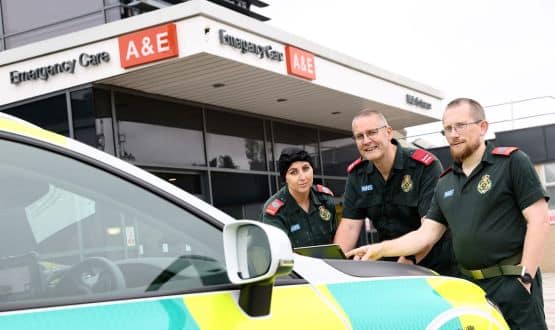GDE digital ‘blueprints’ to be rolled out to other NHS Trusts
- 8 February 2019

Digital “blueprints” made by the Global Digital Exemplars (GDE) have been made available to hospitals and could save hundreds of lives.
The toolkits allow any NHS hospital to implement improvements quicker and transform care for both patients and staff.
Up to 200 lives a year are being saved at Royal Liverpool and Broadgreen University Hospital thanks to early sepsis recognition using digital technology.
Screening at the hospital’s emergency department is now at 100 per cent and antibiotics given within the first hour has increased 90%.
Other trusts using digital blueprints to improve their care include Salford Royal NHS Foundation Trust, which is using an electronic assessment tool to test for delirium in patients over 65.
Matthew Swindells, deputy chief executive of NHS England, said: “Using straightforward technology to its fullest in the NHS will not only improve patient care and safety, but can also free up staff time.
“Some NHS hospitals are already making a huge difference to the care they offer through digital tools, and with these new blueprints it will now be easier than ever for other NHS organisations to learn from the best we have and improve care for their patients faster.”
The blueprints have been created as part of NHS England’s Global Digital Exemplar programme, which aims to create a group of reference sites for NHS digitisation and provide standardised blueprints for other trusts to follow.
There are currently 16 acute global digital exemplars, which have 17 fast followers; seven mental health GDEs, and three ambulance GDEs, however it was confirmed in September 2018 that more GDEs could be on their way.
Will Smart, chief information officer for health and care, said: “Our blueprinting work will help NHS trusts drive their use of digital far more quickly and cost effectively than has been possible in the past, adopting successful technology and projects that have already made an impact elsewhere.”
Health Secretary Matt Hancock added: “We have the opportunity to build the most advanced health and care system in the world and harness the full potential of technology to improve the lives of patients and empower people to take greater control of their own healthcare.”
The new blueprints include:
Royal Liverpool and Broadgreen University Hospitals NHS Trust
The trust introduced E-sepsis, a clinical decision support tool, with screening now at 100 per cent in the emergency department (ED) and on its wards; antibiotic administration for patients with sepsis within an hour has increased to 90 per cent in ED and 60 per cent on wards and septic shock mortality in the under-45s has dropped from 60 per cent to 7.69 per cent.
Northumberland, Tyne and Wear NHS Foundation Trust
Over 4,000 mental health staff at Northumberland, Tyne and Wear NHS Foundation Trust are now able to access electronic patient records securely from anywhere, transforming care delivery. This has supported clinical staff to access systems and information remotely, from care homes to providing street triage services with the police. Implementation of the street triage team has reduced use of police detaining people under Section 136 of the Mental Health Act by 78 per cent.
Salford Royal NHS Foundation Trust
Salford Royal NHS Foundation Trust’s new electronic assessment tool for delirium has increased screening of over 65-year-olds on admission to hospital and has increased assessment of those who become newly confused when they are in hospital, with the number of identified cases per year having risen by 34 per cent and the length of stay for these patients has reduced by 11 per cent. It has saved an estimated £1.7m in the first year. Readmissions for delirium patients has also reduced from 15 per cent to 13 per cent saving an estimated £101,000 for the same period.
Gateshead Health NHS Trust
At Gateshead Health NHS Trust pathology tests – such as blood tests – are now being turned around in 25 minutes since the Trust moved from a paper-based system to an electronic order comms system. Before changing systems in 2010, Gateshead used paper forms filled in by hand to request blood tests and X rays. Results of tests were reported back to clinical teams on paper slips, which were sometimes posted to the location where the request had been made only for the patient to have been moved.
Cambridge University Hospitals
Cambridge University Hospital’s introduction of barcode medication administration (BCMA) has improved patient safety by reducing the overall rate of adverse drug events and decreasing transcription errors. Medication scanning is live across all inpatient areas and the emergency department. On average 168,000 medication administrations are scanned per month. Staff at the Trust reported feeling “safer” in administering medication due to the clinical decision support and alerts,




5 Comments
I’ll say again hearts and minds of those on the ground need to be achieved as well as policy that a) states this is mandatory and b) no paper available that staff can fallback on. All the blueprints in the world will not help until these are in place.
Hi Paul – Congrats on reaching this milestone. Could you also share the Blueprints so we can publicly publish them on Digital Health? The digitalhealth.net site gets about 50K unique readers per month — which would certainly help get them seen by the widest possible audience. Thanks Jon
Hi All
We just thought it might help if you could access the NHS Futures site – here s the link
https://www.digitalhealth.net/2019/02/global-digital-exemplar-blueprints-nhs-trusts/
Co-chair Blueprinting Steering Committee
Hi Peter
Any help developing a blueprint about how to shift culture from analogue to digitsal would be gratefully received
For many of these to work efficiently there needs to be sufficient “buy-in” from staff and senior management. For example a couple of years ago I needed a test at Southend Hospital and the Consultant asked a nurse to take the the appropriate test. When I saw him completing a paper form I asked why he was not using the hospital ICE system – he said “I’m old fashioned and prefer paper”. Unfortunately I believe this type of attitude is still fairly prevalent and until staff are tole that they must use digital systems not much will change.
Comments are closed.